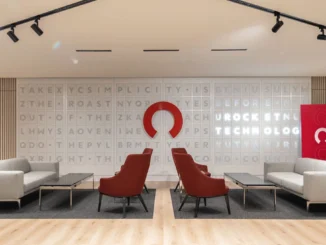
Rocket Companies, the parent of Rocket Mortgage, lost money in 2023, but executives have expressed confidence about a big turnaround by touting investment in artificial intelligence (AI) to accelerate the company’s profitability.
Despite reporting a GAAP net loss of $390 million in 2023, investors seem to be sold on the company’s path towards Rocket’s “AI-fueled homeownership strategy,” a phrase repeatedly used by executives in a fourth-quarter earnings call on Thursday.
Rocket’s stock price rose to $11.75 per share at market open on Friday, up from $10.98 per share at market close the day before.
The three big pillars Rocket is betting on for profitability are AI-driven productivity, which in turn will bring increased profit; its acquisition of new clients and market share; and deep pockets for continued investment, which includes a lot of cash.
AI driving productivity across the board
The bottom line as to why Rocket is pushing hard on AI? It boils down to increasing capacity at scale via higher productivity.
The three areas in which AI is driving impact are mortgage banking, underwriting and servicing, Rocket CEO Varun Krishna shared with analysts during the latest earnings call.
Its pilot AI virtual assistant enabled mortgage bankers to do the most important work when working with clients, with technology taking care of tedious tasks such as filling out applications and remembering regulatory requirements — things that bankers had to do before AI was implemented.
About two-thirds of Rocket’s income verification tasks were automated in December, without an underwriter needing to intervene. As a result, Rocket’s automated income verification provided a five-fold improvement compared to 15 months earlier, Krishna explained.
In addition, AI has enabled 70% of Rocket’s servicing calls and chats to become fully self-served, also freeing up time for team member assistance.
“If you increase the productivity, you increase the capacity, but you also increase the velocity. If you increase the velocity, that means faster turn times, and faster return times mean better client experiences,” Brian Brown, chief financial officer at Rocket Companies, told analysts.
“… Having faster turn times means, in a very competitive market, it makes your offer stronger because you can close faster. To the extent that you can get loans off your balance sheet faster, it lowers your financing costs. So, we completely believe that these will translate into financial metrics and, frankly speaking, they already have, through some of the investments in 2023.
“We believe we can keep our fixed costs relatively flat (with AI) while originating significantly higher volumes.”
New client and market share acquisitions
In a rare move, Rocket shared specific numbers of its market share growth.
The company’s shares of the purchase and refinance markets expanded by 14% and 10%, respectively, from 2022 to 2023. The company doesn’t break out purchase business versus refinances in its earnings reports.
In 2023 alone, the mortgage industry saw a total of 62 merger and acquisition transactions, lender exits and bankruptcies.
Because Rocket absorbed some of the market share from lenders that closed their doors, it’s no surprise that it increased its market share despite a decline in origination volume from 2022.
To court more clients, Rocket launched products targeted at accumulated home equity levels and potential homebuyers who face affordability challenges.
Rocket rolled out ONE+, a conventional 1% down home loan program for lower-income buyers, where the lender covers the remaining 2% needed to reach the required threshold for conventional loans.
The BUY+ program provided borrowers a credit equal to 1.5% of the purchase loan amount when using a real estate agent from Rocket Homes to find a property.
In particular, volume for Rocket’s home equity loan products tripled between the first and fourth quarters of 2023.
“Home equity loans, ONE+ and BUY+ are unique products that have resonated strongly with both existing and new clients,” Brown said. “Notably, the vast majority of our clients who came to us through these products were new clients who did not already have a loan with us.
“These innovative solutions helped us attract new clients into the Rocket ecosystem.”
Deep pockets to pull from
For a company with a market cap of $23.3 billion and increased liquidity as of the fourth quarter, executives were confident that Rocket is well positioned to differentiate itself from other lenders that have joined the AI wave.
“AI is something that you have to have a right to win. A right to win means you have to have the assets, you have to have capabilities, you have to have data, you have to have these ingredients to create the right recipe. So, because of those ingredients that we have at scale, it’s why we expect to be a benefactor,” Krishna said to an analyst who asked what puts Rocket ahead of the competition.
Rocket reported $9 billion in liquidity as of Dec. 31, 2023, up from $8.7 billion in liquidity in the previous quarter. The Detroit-based lender had more cash on hand ($1.1 billion) at the end of last year than it did at the end of 2022 ($1 billion).
The firm also drove significant recurring revenue for mortgage servicing in the fourth quarter, which in turn generated $348 million of cash revenue from its servicing book.
In terms of operations, Rocket was all about cutting businesses that didn’t generate revenue and prioritizing the money-making operations.
Cost structures were cut by nearly 20% last year, including the sunsetting of Rocket Solar and Rocket Auto, while investing money in innovation.
Executives emphasized that investment in AI will be applied to other parts of the business in addition to mortgage banking, underwriting and income verification.
“We have a durable advantage because we have many of the ingredients that it takes to build one of the AI companies of the future. … You can expect to see many more as we continue to make progress on this journey. But it is a major strategic imperative and we’re investing across the board.”



